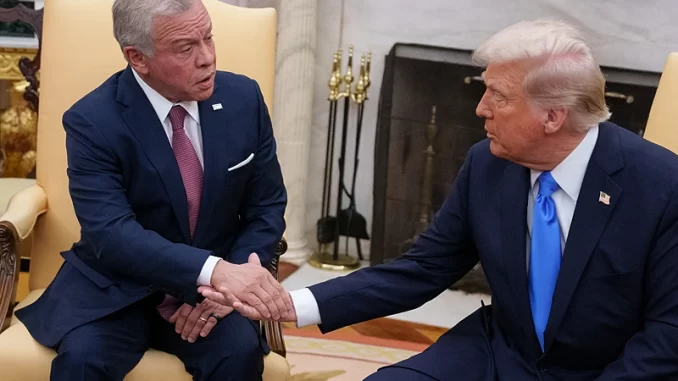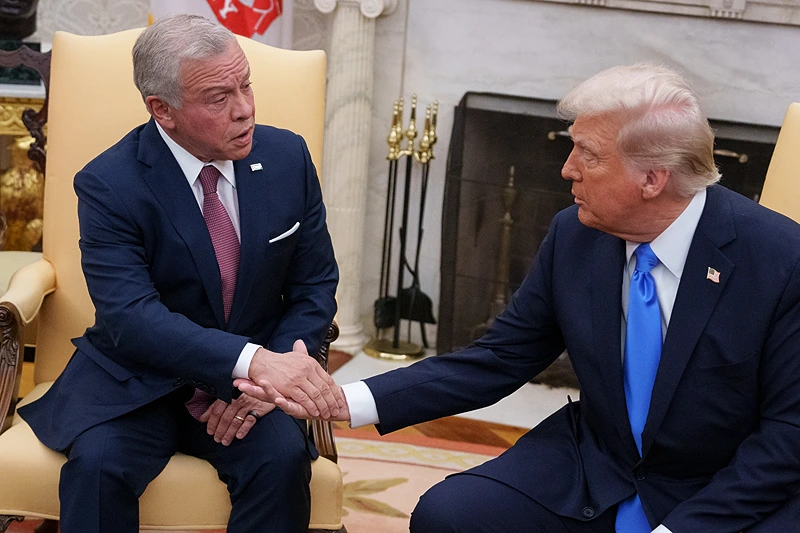

OAN Staff Brooke Mallory
2:15 PM – Tuesday, February 11, 2025
As part of his plan to rebuild destruction in the Middle East and relocate Palestinians, President Donald Trump welcomed King Abdullah II of Jordan to the White House on Tuesday, increasing pressure on the Arab country to accept refugees from Gaza.
Advertisement
At the West Wing’s entrance, Trump greeted Crown Prince Hussein and Abdullah, referring to the monarch as a “great man.”
Trump held a working lunch in the Cabinet Room and a private discussion in the Oval Office.
The visit coincides during a contentious time for the current ceasefire in Gaza, as Hamas has announced that they are halting further hostage releases while accusing Israel of breaking the truce.
This declaration has even prompted Israeli Prime Minister Netanyahu to warn Hamas that if they don’t release more hostages by this Saturday, February 15th, then the war will resume from Israel’s side.
The alleged “proof” that Israel broke the agreement comes down to claims by the Palestinian Ministry of Health. However, the Palestinian Ministry of Health, which manages healthcare in the West Bank, is controlled by Hamas and it answers to them and their demands. The ministry has also been caught skewing the number of deaths of Palestinians – therefore not making it a reliable source.
If those still in captivity are not released by this weekend, Trump has also threatened that “all hell will break loose” for Hamas.
According to Trump, the United States should annex Gaza in order to make it “the Riviera of the Middle East,” telling Palestinians living in the war-torn region to relocate into neighboring Muslim countries while the U.S. rebuilds.
In an effort to convince Jordan and Egypt, two of the United States’ closest friends and major recipients of its foreign aid, to take in more Palestinians from Gaza, Trump said on Monday that he will, if necessary, withhold U.S. aid from them if they do not comply.
“If they don’t, I would conceivably withhold aid, yes,” Trump told reporters.
More than two million Palestinians already live in Jordan, though they have ironically expressed opposition to Trump’s proposal to move their fellow people out of Gaza into their country — along with other Arab nations. According to Ayman Safadi, the foreign minister of Jordan, the country’s resistance to Trump’s proposal is “firm and unwavering.” However, with the amount of foreign aid they receive from the U.S., many have questioned why Jordan’s foreign minister is acting as if they have the upper hand.
Egypt and Jordan have quietly expressed security concerns in regards to accepting substantial numbers of more refugees into their countries, even temporarily, in addition to worries about endangering the long-held objectives of a two-state solution to the Israeli-Palestinian issue. This is due to the fact that Palestinians have a bad reputation in the Middle East, leading to other nearby Muslim countries not wanting to take them in.
“In truth nearly every Arab state has long viewed the Palestinians with ‘fear and loathing,’” according to former U.S. Ambassador Ryan Crocker.
A recent report from Stanford also suggested that Palestinians are more apathetic and unruly than Muslims in other regions, and they tend to not take leadership or authority as seriously.
“The Palestinians don’t feel that any of their leaders are really legitimate in this sense,” said Michael Robbins, principal investigators at Arab Barometer, a nonpartisan research network that conducts public opinion surveys in the Middle East and North Africa. “The U.S. [also] has very little credibility in the minds of ordinary Palestinians,” he added.
Additionally, “Christians make up less than 1.5 percent of the overall Palestinian population,” according to Reuters.
Trump continued to explain his thoughts on the matter.
After being asked how he would persuade Jordan’s king to take in Palestinians, whom have a bad reputation among virtually all Arab Muslim countries, Trump told reporters: “I do think he’ll take, and I think other countries will take also. They have good hearts.”
During his visit, the king also met with senior members of the Trump administration, including Defense Secretary Pete Hegseth, Middle East envoy Steve Witkoff, Secretary of State Marco Rubio, national security adviser Mike Waltz, and a bipartisan group of senators on Capitol Hill.
Since his inauguration on January 20th, he is the third foreign leader to meet with Trump face-to-face.
During a press conference with Israeli Prime Minister Benjamin Netanyahu last week, Trump also outlined his plans for relocating Palestinians from Gaza and assuming U.S. sovereignty over the region.
At first, he did not rule out sending American forces to help secure Gaza, but he also later stated that no U.S. money would be used to rebuild the region, which raised some questions regarding the nature of his proposal.
Secretary of State Marco Rubio and White House press secretary Karoline Leavitt emphasized that the president only wanted Palestinians to be moved out of Gaza “temporarily” following Mr. Trump’s original remarks. They also demanded an “interim” period to allow for rehabilitation, rubble removal, and the disposal of explosive munitions.
Stay informed! Receive breaking news blasts directly to your inbox for free. Subscribe here. https://www.oann.com/alerts
Advertisements below

